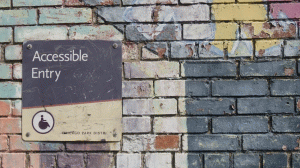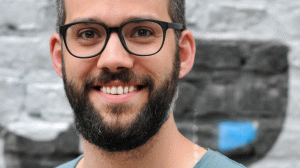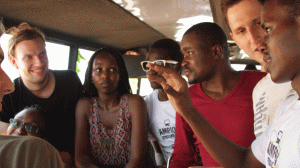Thriving communities for impact can play a fundamental role in tackling complex social and environmental challenges. Members get the rare opportunity to feel a true sense of connection, which creates the foundation for empathy and honesty. Not to mention the diversity in perspective, cultures and backgrounds provides rich soil for co-creation.
The ideas or projects that emerge have the potential to be deeply rooted in systemic understanding. Thus communities can be a fountain for SDG 17 - partnership for the goals. The challenge: we need to get them set-up for success.
Why community?
Drawing on Niko Paech, the German economist and growth critics, there are four birthplaces for change: economy, technology, politics, community. With Australia’s devastating fires, climate change denial, increasing political tensions from the US I sometimes wonder what it will take to rethink our systems. What does it take to build a world in which nature and humans live in harmony?
When looking at the situation of our planet, Paech concludes that the economy thrives for wealth and that no technology has ever been developed and implemented at scale within a given timeframe, and that our recent political parties are directed by lobbyism and security of power. From this perspective what endures as a lever for change is culture and community. The area with the biggest potential is communities, but how?
The root of community
Communities are a fundamental piece of our DNA as humans living in a web of relationships that provide us with a sense of belonging. Our ancestors lived in communities since humanity came into existence because it increased their chances of survival. Elders or "the fittest" were often the ones responsible to build and sustain community, in which members cared for each other, wisdom was exchanged from generation to generation and people had the chance to split daily tasks based on their abilities. Thinking about this original sense of community the fundament it stands for is trust, togetherness and the greater good.
Technology has changed and expanded the way we define community. Every niche topic that could not find enough momentum in one location can now attract a group of people online, who, if constantly engaged become a community. From physical communities made up of people we live with to a choice between hundreds of communities that call out for members: thematic communities.
Communities aiming for positive change
For our purpose, let's exclude business communities and focus on those focused on social and environmental impact. Here a few examples:
- Thematic communities such as Impact Hub, convene entrepreneurs across the globe supporting all kinds of SDGs to get inspired, learn and connect.
- Alumni communities such as the Bosch Alumni Network from the Robert Bosch Foundation, aim to connect and empower past beneficiaries around societal challenges.
- Organisational communities operate within organisations such as WWF who has 50+ global communities each coordinating around conservation topics across their 100 offices.
Communities have so much potential because they offer a space for individuals from diverse backgrounds to connect to each other, learn from each other and take action together. Communities offer a safe space to grow and fail and change our behaviour. But this can only happen if communities are set-up to allow this magic to unfold. Here are the most common challenges across communities:
-
Strategy
Too many communities have no strategy at all. Consequently, they struggle with structure and direction. People get really excited about creating a community and do so without doing the prep work. Especially important is a clear purpose, the value-added for members, and the core structure. -
Awareness
Most communities are not aware that like products or organisations, communities also go through different life cycles. Each life cycle requires a different kind of activity and different leadership. In a community cycle, it goes from initiation with an entrepreneurial mind and hierarchical structures to mitosis based on emergence and coaching leadership. -
Funding
Many communities are foremost run by volunteers. Let's face it no budget, no impact. Financial sustainability needs to be a theme communities think and talk about. Can we expect a community to play a fundamental role in tackling societal challenges while the community builder still needs to maintain a side job to make a living? -
Capabilities
A community builder needs to listen to their members, facilitate sessions, work on strategy, complete impact measurement, lead teams, ensure financial stability, organise events and more. It is truly the most challenging role but also has the potential for the most fulfilling one. Community builders need more support on all levels: skills and growth, mental health, peer exchange.
-
Communities have always connected us as humans. Let’s reinforce this inner longing for connectivity in our virtual and in-person communities. Taking community-building seriously helps communities to become a place where collective power gets unleashed.
-
For more check out communitiesforimpact.org
About
The iac Berlin, the Impact Hub network, WWF Switzerland, Luc Hoffmann Institute, and Ouishare have joined forces with 25+ communities to create Virtual Communities for Impact, a practical and adaptable toolkit that empowers community builders to learn from the experience of their peers and unleash the collective power of their community. On a single platform, find best practices, practical examples, case studies, tools and resources: communitiesforimpact.org.

Anne Merkle
Anne leads the global partnership between WWF and Impact Hub which follows the intention to combine innovation and conservation. Both networks struggled with the theme of community building which is why the project Communities for Impact emerged, in which Anne functioned as a project manager and writer. After a B.Sc. Non-Profit Management, Anne spent many years working with NGOs, Global Networks, Accelerators and Foundations to walk in their shoes and understand what is driving and hindering them to collaborate for impact. In her role as a hybrid between two global networks, she builds up capacity, designs global programs and supports the development of local partnerships between WWF offices and Impact Hubs. www.linkedin.com/in/anne-kathrin-merkle-6926459a












